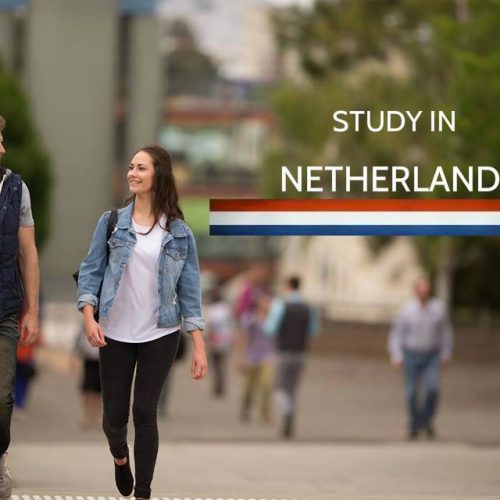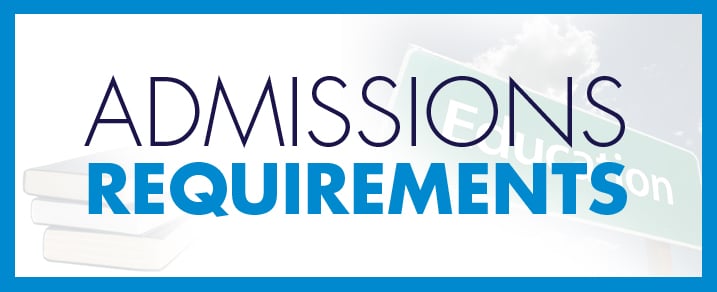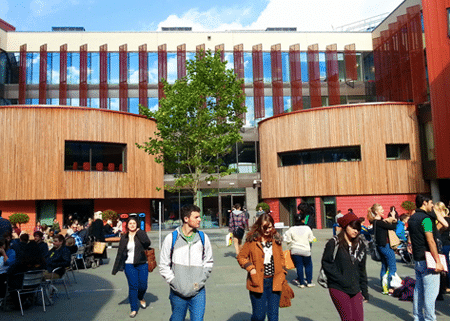Study in Netherlands




The Netherlands is a great place to study in if you love exploring, as it is close to some of Europe’s best travel destinations. It has high-speed train connections to Paris. In addition, there are short-distance flights between it and London. In addition, you can visit Madrid and Rome within just a few hours.
Here are top four reasons to study in Holland:
1- World-Renowned Education:
The Netherlands has 13 globally ranked universities, which is very impressive. In addition, one of its universities has gained 12 Noble Prize laureates. That means the standard of Education is very high in the Netherlands. In addition, if you choose to study in it, you will have so much knowledge and experience.

2- Outstanding Architecture and Engineering Studying:
If you are going to study Architecture, Engineering or urban planning. The Netherlands is the best place to do so because of it’s amazing, outstanding and spiritual places.
3- Scholarships for international students:
If you are going to study in the Netherlands, then you will be able to choose from a lot of opportunities and scholarships that the government of Netherlands gives to the international students.
4- the Netherlands speaks English:
Everyone in the Netherlands can speak English, which makes things easier for you as an international student. In addition, many courses at Dutch universities are offered in the English language. All of that makes it easier for you to live, study and communicate in the Netherlands.
- Tuition Fees and Living Expenses
- Admission Requirements
- Working in Netherlands
- Visa Process
- Study Language in Netherlands
- Our Partners' Universities

Tuition Fees and Living Expenses
Tuition Fees in the Netherlands
The Netherlands universities favor the EU and the EEA students. Therefore, if you are a non-EU or a non-EEA student, your tuition fees will be double or triple the amount of the tuition fees of the EU or EEA student.
On average, tuition fees for EU student are 2000 Euro per year.
While for a non-EU student is starting from 6000 – 7500 per year.
Living Expenses cost in the Netherlands:
Estimated Cost of Living:
International students who will live and study in the Netherlands can make the average of their budget between 800 to 1100 Euro per month.
Housing will cost the international student between 300 to 600 Euro per month.
General Costs per Month on average: | |
300 – 600 Euro | Housing |
170 Euro | Food |
35 Euro | Transportation |
23 Euro | Internet |
165 Euro | Utility |
30 – 65 Euro | Books and learning materials |
50 – 60 Euro | Social activities |

Admissions Requirements
The requirements for international students in the Netherlands are transparent and there are no intake exams.
Most universities require that international students must:
– have a secondary school or higher education diploma or an equivalent.
– have the finances required to study in the Netherlands.
– CV.
Language Requirements:
– pass the IELTS or TOEFL test with appropriate results.
Application Deadlines:
Many Dutch universities have enrolment twice a year. In September “fall semester” and in February “spring semester”.
Required Application Documents:
– A copy of passport or ID card.
– A passport picture.
– A personal statement in English.
– Transcript of records.
– Application fees.
Program duration:
- Bachelor programs duration: 4 years.
- Master programs duration: 1 – 2 years.

Working in the Netherlands
If you are an EU or an EEA student, you can work freely without restrictions.
If you are non-EU students, there are some restrictions.
As an international student with a residence permit for study, do not have the permission to work without a work permit. In order to have this work permit, your employer needs to apply for your work permit.
International students are permitted to work for a maximum number of 10 hours per week and full-time during vacations.

Visa Process
For an EU student:
EU students do not need a student visa or a residence permit to study in the Netherlands, however, if the student plans to stay for a long-term, he must register with the municipality as soon as possible after he arrives.
For a non-EU student:
As an international student, you need to have a student visa in order to go to the Netherlands and study in it.
There are two types of student visa:
– Short study “up to three months”.
– Long study “over three months”.
In addition, for both visas, you need to have a residence permit.
You can apply for a student visa at the Netherlands consulate in your country.
– The university can also apply for the residence permit on your behalf through the Dutch immigration.
– You can get your residence permit in up to three months.
– The processing time:
The processing time for your visa applications usually lasts one month.
– The required documents for the student visa:
– Valid passport.
– Sufficient financial means.
– A proof that the required fees are paid.
– A proof that you are not a danger to the public order or the national security in the Netherlands.
– An acceptance letter from a Dutch university.
– A copy of work permits if you are going to work there.
– Completed visa application form.
– Two photos.
– Birth certificate.
– Academic transcripts.
– Motivation letter.
– Financial proof for the entire period of study “around 870 Euro per month”.
– Visa application fee “317 Euro”.
– Travel and health insurance.
– Copies of the original documents.
Our office is ready to help you with all procedures starting from finding the right universities and courses to the admission and getting the acceptance letter until the applying for the student visa and the admission to the university.

Study English in the Netherlands:
As an international student, you have several options for studying in the Netherlands. You can enroll in an English-taught degree program or short course.
So many courses are available at different levels:
– Beginners.
– Intermediate.
– Advanced.
There are also more than 2100 study programs taught in English in the Netherlands.
By studying English in the Netherlands, you will:
– Expand your vocabulary.
– Improve your listening and writing.
– Increase your conversational skills.
– Develop your reading and self-study skills.
– Improve your pronunciation and understanding of grammar.

Our Partners’ Universities
University Name | Website |
FSG Academy | |
Tio University of Applied Sciences | |
Wittenborg University of Applied Sciences |

Tuition Fees and Living Expenses
Tuition Fees in the Netherlands
The Netherlands universities favor the EU and the EEA students. Therefore, if you are a non-EU or a non-EEA student, your tuition fees will be double or triple the amount of the tuition fees of the EU or EEA student.
On average, tuition fees for EU student are 2000 Euro per year.
While for a non-EU student is starting from 6000 – 7500 per year.
Living Expenses cost in the Netherlands:
Estimated Cost of Living:
International students who will live and study in the Netherlands can make the average of their budget between 800 to 1100 Euro per month.
Housing will cost the international student between 300 to 600 Euro per month.
General Costs per Month on average: | |
300 – 600 Euro | Housing |
170 Euro | Food |
35 Euro | Transportation |
23 Euro | Internet |
165 Euro | Utility |
30 – 65 Euro | Books and learning materials |
50 – 60 Euro | Social activities |

Admissions Requirements
The requirements for international students in the Netherlands are transparent and there are no intake exams.
Most universities require that international students must:
– have a secondary school or higher education diploma or an equivalent.
– have the finances required to study in the Netherlands.
– CV.
Language Requirements:
– pass the IELTS or TOEFL test with appropriate results.
Application Deadlines:
Many Dutch universities have enrolment twice a year. In September “fall semester” and in February “spring semester”.
Required Application Documents:
– A copy of passport or ID card.
– A passport picture.
– A personal statement in English.
– Transcript of records.
– Application fees.
Program duration:
- Bachelor programs duration: 4 years.
- Master programs duration: 1 – 2 years.

Working in the Netherlands
If you are an EU or an EEA student, you can work freely without restrictions.
If you are non-EU students, there are some restrictions.
As an international student with a residence permit for study, do not have the permission to work without a work permit. In order to have this work permit, your employer needs to apply for your work permit.
International students are permitted to work for a maximum number of 10 hours per week and full-time during vacations.

Visa Process
For an EU student:
EU students do not need a student visa or a residence permit to study in the Netherlands, however, if the student plans to stay for a long-term, he must register with the municipality as soon as possible after he arrives.
For a non-EU student:
As an international student, you need to have a student visa in order to go to the Netherlands and study in it.
There are two types of student visa:
– Short study “up to three months”.
– Long study “over three months”.
In addition, for both visas, you need to have a residence permit.
You can apply for a student visa at the Netherlands consulate in your country.
– The university can also apply for the residence permit on your behalf through the Dutch immigration.
– You can get your residence permit in up to three months.
– The processing time:
The processing time for your visa applications usually lasts one month.
– The required documents for the student visa:
– Valid passport.
– Sufficient financial means.
– A proof that the required fees are paid.
– A proof that you are not a danger to the public order or the national security in the Netherlands.
– An acceptance letter from a Dutch university.
– A copy of work permits if you are going to work there.
– Completed visa application form.
– Two photos.
– Birth certificate.
– Academic transcripts.
– Motivation letter.
– Financial proof for the entire period of study “around 870 Euro per month”.
– Visa application fee “317 Euro”.
– Travel and health insurance.
– Copies of the original documents.
Our office is ready to help you with all procedures starting from finding the right universities and courses to the admission and getting the acceptance letter until the applying for the student visa and the admission to the university.

Study English in the Netherlands:
As an international student, you have several options for studying in the Netherlands. You can enroll in an English-taught degree program or short course.
So many courses are available at different levels:
– Beginners.
– Intermediate.
– Advanced.
There are also more than 2100 study programs taught in English in the Netherlands.
By studying English in the Netherlands, you will:
– Expand your vocabulary.
– Improve your listening and writing.
– Increase your conversational skills.
– Develop your reading and self-study skills.
– Improve your pronunciation and understanding of grammar.

Our Partners’ Universities
University Name | Website |
FSG Academy | |
Tio University of Applied Sciences | |
Wittenborg University of Applied Sciences |

